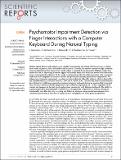Psychomotor Impairment Detection via Finger Interactions with a Computer Keyboard During Natural Typing
Author(s)
Giancardo, Luca; Sanchez Ferro, Alvaro; Butterworth, Ian Richard; Sanchez Mendoza, Carlos; Hooker, Jacob M.
DownloadGiancardo-2015-Psychomotor impairment.pdf (1.364Mb)
PUBLISHER_CC
Publisher with Creative Commons License
Creative Commons Attribution
Terms of use
Metadata
Show full item recordAbstract
Modern digital devices and appliances are capable of monitoring the timing of button presses, or finger interactions in general, with a sub-millisecond accuracy. However, the massive amount of high resolution temporal information that these devices could collect is currently being discarded. Multiple studies have shown that the act of pressing a button triggers well defined brain areas which are known to be affected by motor-compromised conditions. In this study, we demonstrate that the daily interaction with a computer keyboard can be employed as means to observe and potentially quantify psychomotor impairment. We induced a psychomotor impairment via a sleep inertia paradigm in 14 healthy subjects, which is detected by our classifier with an Area Under the ROC Curve (AUC) of 0.93/0.91. The detection relies on novel features derived from key-hold times acquired on standard computer keyboards during an uncontrolled typing task. These features correlate with the progression to psychomotor impairment (p < 0.001) regardless of the content and language of the text typed, and perform consistently with different keyboards. The ability to acquire longitudinal measurements of subtle motor changes from a digital device without altering its functionality may allow for early screening and follow-up of motor-compromised neurodegenerative conditions, psychological disorders or intoxication at a negligible cost in the general population.
Date issued
2015-04Department
Massachusetts Institute of Technology. Research Laboratory of ElectronicsJournal
Scientific Reports
Publisher
Nature Publishing Group
Citation
Giancardo, L., A. Sanchez-Ferro, I. Butterworth, C. S. Mendoza, and J. M. Hooker. “Psychomotor Impairment Detection via Finger Interactions with a Computer Keyboard During Natural Typing.” Sci. Rep. 5 (April 16, 2015): 9678.
Version: Final published version
ISSN
2045-2322